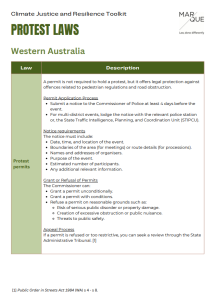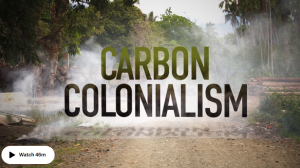1. Practices used to undermine climate change and climate justice
The following corporate strategies are closely related. They all work to deny climate change, create opposition to climate justice action, or make false solutions appear more effective than they are. These strategies are important for CSOs to consider because they highlight the deceptive tactics used to undermine climate change awareness and action, posing significant challenges to genuine efforts towards climate justice. Understanding these strategies is crucial for CSOs because it allows them to effectively counter misinformation, advocate for evidence-based policies, and safeguard the integrity of climate justice initiatives against deceptive practices.
Shifting the blame – individual vs. industrial carbon footprint
Environmental footprint calculators were initially developed as a marketing campaign for British Petroleum (BP) in 2004 (8billiontrees) to shift the blame and accountability of carbon emissions from fossil fuel industries to the individual consumer.
“…an article in the Guardian highlighted the influence oil companies have had on the carbon footprint’s growing popularity. Its main message was that the idea of measuring personal carbon footprints – in other words, calculating the emissions we’re responsible for as individuals – was originally promoted by oil giant BP to shift the burden of action (and blame) from fossil fuel companies to consumers.”
WHAT ORGANISATIONS CAN DO:
Organisations should be mindful not to shift the responsibility for climate action onto the communities they support. It is essential to recognise the systemic nature of climate change. Organisations can advocate for collective solutions that address these root issues and help drive more equitable outcomes for people and planet.
Read more:
Big Oil coined ‘carbon footprints’ to blame us for their greed. Keep them on the hook (The Guardian)
2. Fossil fuel sponsorship
Fossil fuel sponsorship refers to financial support, often in the form of sponsorships or partnerships, provided by fossil fuel companies to various entities, including events, organisations, or initiatives. This type of support typically involves monetary contributions in exchange for visibility or acknowledgment, creating potential ethical concerns due to the association with industries contributing to environmental challenges such as climate change. Fossil fuel sponsorship can influence public perception and raise questions about the independence and motivations of the sponsored activities.
WHAT ORGANISATIONS CAN DO:
Use these tools to cut ties with fossil fuel funding, sponsorships and investments
Develop a fossil fuel free sponsorship policy and/or statement
Engage in investment and divestment
Engage in climate justice advocacy and campaigns
Read more
How to remove fossil fuel sponsorships from sports, arts and events
3. Greenwashing practices
Although some companies are making efforts to be more sustainable, they may exaggerate or misrepresent the environmental benefits of their products or services, creating a misleading impression of their true sustainability. Products and services that are marketed using imagery that looks natural or organic and words such as eco-friendly, green, clean, sustainable, or healthy often require a closer look. Even certifications can be misleading or fake. This means people who are responsible for procuring products and services for organisations need to be aware of greenwashing practices and do their due diligence to make sure their good intentions aren’t being misled or capitalised on.
WHAT ORGANISATIONS CAN DO:
Use sustainable procurement.
Visit: Purchasing, procurement and consumption
Read more:
Greenwashing: energy companies make false claims about sustainability – they should be held to account (The Conversation)
4. Fossil fuel lobbying
Fossil fuel lobbying refers to strategic efforts by individuals, organisations, or industries associated with fossil fuel extraction and consumption to influence government policies, regulations, and decision-making processes in their favour. Fossil fuel lobbying’s influence in Australian politics is evident in various forms, including financial contributions, campaign support, and direct engagement with policymakers. Effectively dealing with this issue involves scrutinising these lobbying activities, promoting transparency, and advocating for policies that prioritise environmental sustainability over short-term economic interests.
WHAT ORGANISATIONS CAN DO:
Community service organisations can advocate for greater transparency in fossil fuel lobbying by supporting legislation that mandates disclosure of lobbying activities and financial contributions from fossil fuel companies. Additionally, they can engage in educational initiatives, coalition building, and public awareness campaigns to empower communities to challenge the influence of fossil fuel interests on environmental policy.
Read more:
How to deal with fossil fuel lobbying and its growing influence in Australian politics (The Conversation)
Captured State: The influence of the gas lobby on WA (350 Perth. Org)
State Capture: (Australian Democracy)
5. Social license to operate and petro-pedagogy
Social licence to operate (shortened to social licence) refers to the societal acceptance or approval of certain practices, policies, or industries. In the context of climate-related discussions, it involves the perceived legitimacy of activities that may contribute to environmental harm. Fossil fuel companies, for instance, actively work towards securing social licence by funding sports and cultural events and venues, a practice known as “sportwashing” Through such strategies, they seek community approval and divert attention away from their environmental damage. This is also seen in outback communities where the industry attempts to expand its operations. Moreover, petro-pedagogy, a school/education/youth and child care specific concept, in which a narrative pushed by fossil fuel interests—frames climate change as inevitable and encourages individual responsibility as the main solution. This focus on personal actions and technological fixes shifts attention away from the root causes of climate change and the industry’s role in it. Climate justice requires addressing these systemic issues and advocating for equitable climate action instead of letting such strategies sustain harmful industries and perpetuate inequality.

(Source: Petro-pedagogy: fossil fuel interests and the obstruction of climate justice in public education)
WHAT ORGANISATIONS CAN DO:
To combat these issues, organisations can transition out from fossil fuel funding, advocate for transparency in fossil fuel sponsorships, challenge misleading narratives, and promote climate justice initiatives that address root causes rather than focusing solely on individual actions.
Read more:
The forgotten oil ads that told us climate change was nothing (The Guardian)
Fossil fuel sponsorships and social licence (The Australian Centre for Corporate Responsibility)
6. Climate-denial in media
Climate Denial in the media is mainly seen within privately owned media (in democratic countries) that are owned or financed by people and businesses that have a political and economic agenda and interest in resource extraction. Within democratic countries, state-owned media tend to have a more objective and science-based messaging. This can have severe consequences as it influences people’s thinking, discussions, judgement, decision-making and voting.
As an alternative, climate-conscious media refers to outlets and platforms that prioritise accurate and responsible reporting on climate change and related environmental issues. These media sources aim to raise awareness, educate the public, and advocate for sustainable practices. Climate-conscious media often emphasises the scientific consensus on climate change, the impact of human activities, and the urgent need for collective action to address environmental challenges. Reliable media are either state-owned media in democratic countries or independent community-owned media that pursue values of human rights, environmental rights and democracy.
One example can be seen in the context of Australian bushfires, where “social media experts have warned of a disinformation campaign aimed at creating a false narrative of arson being solely responsible for the Australian bushfire emergency.” Such disinformation narratives, where users of the hashtag #ArsonEmergency undermine the link between bushfire and climate change.
Find more examples in this link:
WHAT ORGANISATIONS CAN DO:
See Climate conscious media & media literacy for more information and advice to spot and tackle disinformation and propaganda.
7. Silencing climate activism and advocacy through anti-protest laws
A number of state governments in Australia have attempted to introduce anti-protest laws that criminalise peaceful protest. The laws undermine the democratic right to peacefully protest and attempt to silence people who speak up about climate change and against polluting industries. Understanding these laws is crucial because they might not only stop climate justice activism and advocacy but also threaten our democratic principles. Although protest is not criminalised in every Australian state, the attempt to pass anti-protest laws and use excessive force legal and intimidation tactics on activists is a deliberate effort to deter climate activists.
“Western Australia and Queensland have worked hard to protect their key stakeholders (mining companies)
with laws designed to criminalise any activity that might get in the way of business as usual.
In WA, it is now illegal to “prevent a lawful activity” or “possess a thing” that might be used to do that.
Tasmania and Victoria have gone particularly hard to wipe out anti-logging protests and activities.”
(Source: Michael Bradley, Crikey)
“There is no express right to protest or to hold a peaceful assembly in Western Australia (‘WA’).
The right to protest comes from the implied freedom of political communication found in the Australian Constitution.
This means that the government cannot make laws that prohibit or significantly impede a person’s right to protest.”
Protest and Police Powers in Western Australia
(Source: Protest Laws Overview Created by Marque Lawyers for the Climate Justice and Resilience Toolkit)
The Environmental Defenders Office has developed a factsheet as a guide to readers in a plain English overview of the law.
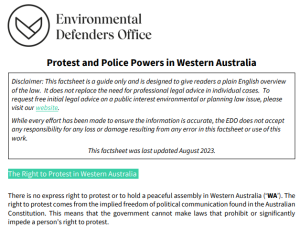
The Australian Human Rights Law Centre, in its recent report, stated that
“Over the past two decades, 49 laws affecting protest have been introduced in federal, state and territory parliaments.
New South Wales has introduced the most anti-protest laws,
while South Australia has the toughest financial penalties with fines of up to $50,000 for common protests.”
“If there were no protests, women would not have the vote.
First Nations peoples would not be citizens. Marriage would not be equal.
Governments would not be accountable, and corporations would not worry about their social licence.
We applauded as “people power” toppled totalitarian regimes. Those authoritarians all began the same way:
by stripping freedoms, shred by imperceptible shred.
One day we will wake up to an outrage, inflicted or enabled by government,
that is so unspeakable we will feel we must march in protest. We will be too late.”
(Source: Michael Bradley, Crikey)
WHAT ORGANISATIONS CAN DO:
To counter these challenges, organisations can advocate for the protection of protest rights, raise public awareness about the implications of anti-protest laws, and support campaigns that highlight the importance of peaceful activism in achieving social and environmental justice.
Read more:
Protest Peril – Our Shrinking Democracy Report (Human Rights Law Centre)
How criminalisation is being used to silence climate activists across the world (The Guardian)
Pushback in Australia against increasingly draconian protest laws (Al-Jazeera)
Australia’s war on protesters should concern you (Crekey)
8. Anti-climate propaganda in social media
Imran Ahmed, CEO and founder of the Center for Countering Digital Hate (CCDH), highlights the growing threat of modern climate denial in the digital age. He explains how opponents of climate action have shifted tactics from denying climate change to undermining confidence in the solutions, particularly through social media platforms. As Ahmed states:
“Scientists have won the battle to inform the public about climate change and its causes, which is why those opposed to climate action have cynically switched focus to undermining confidence in solutions and in science itself. Young people spend a huge amount of time on video-sharing platforms like YouTube. These new forms of climate denial, which have proliferated rapidly over the last six years, are designed to confuse and weaken public support for climate action in the coming decades. It is hypocritical for social media companies to claim to be green but then monetise and amplify lies about the climate. It is time for digital platforms to put their money where their mouth is. They should refuse to amplify or monetise cynical climate denial content that undermines faith in our collective capacity to solve humanity’s most pressing challenge.”
Imran Ahmed, CEO and founder of the Center for Countering Digital Hate (CCDH)
(Source: Centre for Countering Digital Hate)
WHAT ORGANISATIONS CAN DO:
To address this challenge, organisations can engage in media literacy campaigns that educate staff and community on identifying and countering misinformation. They can also advocate for social media companies to implement stricter policies against the monetisation and amplification of climate denial content, ensuring that these platforms fulfil their responsibility in combating disinformation.
9. Privatisation of energy, water and other resources
Privatising energy, water, and other resources is often claimed to be efficient, innovative, and beneficial for societies, but this can be misleading. In a neoliberal and capitalist economy, resource privatisation, unfortunately, often tends to focus on making money for owners and shareholders, potentially at the expense of securing sustainable and fair access to resources or environmental protection. Privatisation can increase inequality because resources that help communities meet their basic human needs can easily become too expensive for everyone to afford and unequally distributed. The management of privatised resources is often less transparent than publicly and community-managed resources, resulting in cost-cutting measures that lead to poorer quality services and environmental harm., Additionally, privatisation detracts from the public investments needed to protect resources that belong to the commons, which everyone has a right to. Instead of privatising resources, public and community-owned and managed resources can ensure everyone has fair access to meet their basic human needs.
WHAT ORGANISATIONS CAN DO:
Organisations can take several important steps to promote fair access to essential resources. They can start by supporting community-owned clean energy projects that allow locals to benefit from renewable energy without the influence of profit-driven companies. Additionally, advocating for water sovereignty projects can help protect communities’ rights to manage their own water supplies. Working with local governments to create partnerships can ensure that resource management is transparent and accountable while still allowing for some private involvement. Providing education and training can help communities develop the skills needed to manage resources effectively, and they can engage in policy advocacy to push for regulations that prioritise social and environmental benefits over profit.
Read more:
Initiate or support community-owned clean energy projects
Initiate or support water sovereignty projects
10. List of false climate solutions
As the world tries to mitigate climate change (primarily by reducing fossil fuel-intensive energies and transitioning to more renewable and sustainable energy), some activities are proposed as solutions, but they may actually exacerbate or create new environmental and social problems. These are called “false climate solutions.” They are often branded as quick technological or market-based fixes but, on close inspection, have unfair, inequitable and unjust consequences for most people and the planet. Communities and organisations need to think critically about the potential limitations and negative consequences of climate action before adopting or supporting it.
Read more:
Resist False Solutions to Climate Change (Hoodwinked in the Hothouse)
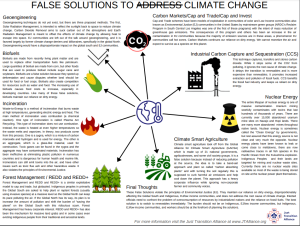
(Source: Justice Alliance)
Carbon offsetting
Carbon offsetting is often seen as a problematic solution to addressing climate change. Carbon offsets often involve tree planting projects, which sequester carbon to balance out emission-intensive activities; basically, it means paying someone else to reduce emissions so a business, government or individual doesn’t have to. Despite its appearance as a simple way to balance carbon emissions, it has many shortcomings. Tree planting does not necessarily draw down carbon in the long term (if those trees are cut or cleared later). The Australian carbon market, where carbon offsets and credits are traded, has a large portion of fraudulent credits. Moreover, relying on offsetting can create a false sense of environmental responsibility, potentially diverting attention from the critical need to directly reduce carbon emissions at their source. Critics argue that carbon offsetting should be considered a supplementary rather than a comprehensive solution, emphasising the greater importance of prioritising direct emission reduction strategies.
Read more:
What is carbon offsetting, and is it worthwhile? (Climate Council)
Offsets: Moving deck chairs on the Titanic (Environmental Defence CA)
The Problem with Carbon Credits and Offsets Explained (Australian Institute)
Carbon Colonialism (Four Corners Documentary)
Bioenergy
Bioenergy, such as biofuels, are an alternative to fossil fuels that derive energy from plant, animal and consumer waste products such as cooking oil and bioethanol. However, as biofuels become more popular, sometimes virgin products are used instead of waste products, meaning that land is cleared and crops are grown to source biomass. This can lead to deforestation, displacement of communities, or increased emissions, all of which undermine bioenergy’s intended environmental and social benefits.
Read more:
The Climate “Solutions” That Aren’t (Conservation Law Foundation)
Bioenergy is a False Solution for Communities and the Climate (Action Aid USA)
Carbon capture and storage
Carbon capture and storage (CCS) technologies aim to collect pollutants and emissions that come from waste and fossil fuels and store them so they aren’t introduced into the atmosphere. While promising in theory, CCS is extremely expensive, faces scalability and efficiency issues, and is not proven to be an effective long term solution to reducing emissions.
Read more:
What is Carbon Capture and Storage? (Climate Council)
Carbon capture: a licence to pollute (Environmental Defence CA)
Nuclear energy
Nuclear energy is ….. Despite being a low-carbon option, nuclear energy comes with concerns about radioactive waste, potential accidents, and high costs, making it a contentious solution. Local and Indigenous communities across WA and Australia have shown strong resistance to housing nuclear power plants or being dumping grounds for nuclear waste.
Read more:
Friends of the Earth – Nuclear Risks
Hydroelectric
Hydroelectric power comes from …. Although relatively clean, large-scale hydroelectric projects often rely on flooding an area to create a dam that displaces the communities and alters the land and river ecosystems, counteracting their clean energy benefits. For large-scale projects like dam construction, the impact on the surrounding land can be substantial. A thorough assessment of this impact is required before planning permission is granted and construction begins. While smaller projects using run-of-the-river systems may have a lesser effect, an assessment is still needed to understand how the river’s flow and ecosystem might be affected. Additionally, silt and sediment build-up from the process could cause long-term harm. Hydrogen also contributes to a warming climate through some complex chemical reactions.
Read more:
We need real climate change plans, not false solutions (Environmental Defence CA)
Land Use and Hydroelectric Power (The Renewable Energy Hub)
Geoengineering
Geoengineering solutions, large-scale technological projects that change the earth system to allow polluting industries to continue, such as solar radiation management, lack consensus on safety and efficacy, and their unintended consequences raise ethical and environmental concerns.
Read more:
Why geoengineering is not a solution to the climate problem (Climate Analytics)
10. Myths about climate change
(adapted from: World Wildlife Foundation)
As the climate crisis garners increased attention across various media platforms, misunderstandings about climate change and its drivers persist. This confusion can hinder effective action and policy-making, making it essential to clarify common misconceptions. Understanding the realities of climate change is crucial for fostering informed public discourse and guiding individual and collective action. Misconceptions can lead to apathy or resistance against necessary changes, such as transitioning to renewable energy or implementing stricter emissions regulations.
The World Wildlife Foundation addressed some of the most common myths to help separate facts from fiction!
Myth 1: The Earth’s climate has always changed
While Earth’s climate has changed over millions of years, the rapid warming we see today is due to human activity. The current rate of warming, happening over decades rather than centuries, is unprecedented and primarily driven by burning fossil fuels.
Myth 2: Global warming isn’t real because it’s still cold
Global warming refers to the increase in Earth’s average temperature, which causes more extreme weather events. Seasonal weather changes, like cold winters, still occur, but overall temperatures are higher than in the past, leading to unpredictable climate patterns.
Myth 3: Heatwaves and wildfires have nothing to do with climate change
Climate change increases the frequency and intensity of extreme weather, including heat waves and wildfires. Warmer temperatures and drier conditions make it easier for fires to spread and cause severe damage to ecosystems and communities.
Myth 4: China is mostly responsible for climate change
While China is currently one of the largest emitters of greenhouse gases, the historical responsibility lies with Western countries, which have contributed significantly over the past 200 years. Climate change is a global issue that requires all countries to take action.
Myth 5: Plants need carbon dioxide
Plants do need CO2 to survive, but the current levels in the atmosphere are far higher than they can absorb. Deforestation and human activity are increasing CO2 emissions beyond what plants can handle, contributing to climate change.
Myth 6: Animals will adapt to climate change
Some species can adapt to changing environments, but the rapid pace of climate change makes it difficult for many to keep up. Habitat loss and human development also prevent species from migrating to survive.
Myth 7: Renewable energy is more expensive
Renewable energy, like wind and solar, is now cheaper than fossil fuels in many cases. As the cost of renewables falls, they offer a more affordable and sustainable alternative to gas and other polluting energy sources.
Myth 8: Renewable energy can only work when it’s not cloudy or windy
Advances in energy storage and grid management mean renewable energy can be reliable, even when the sun isn’t shining or the wind isn’t blowing. Clean energy suppliers ensure that for every unit used, the same amount of renewable energy is fed back into the grid.
Myth 9: Climate change is a future problem
Climate change is already affecting food supplies, migration, and global stability. Immediate action is necessary to mitigate these impacts, and we are the last generation that can prevent the worst effects of the climate crisis.
Other myths:
Australians aren’t responsible for climate change:
The idea that Australians aren’t responsible for climate change is misleading. While Australia’s population is relatively small compared to other nations, its carbon footprint is disproportionately large. Australians have one of the highest per capita carbon emissions in the world, largely due to heavy reliance on coal for electricity and other carbon-intensive industries. Additionally, Australia is a major exporter of fossil fuels, particularly coal and natural gas, contributing significantly to global emissions. Even if these exports are burned overseas, they still contribute to the overall problem of climate change, making Australia an important player in addressing the crisis.
(Source: Australia’s global fossil fuel carbon footprint, Climate Analytics, Fossil fuel exports place Australia among world’s top climate polluters, UNSW Sydney)
The Australian economy and jobs depend on its coal, oil and gas sector:
The claim that Australia’s economy and jobs depend heavily on the coal, oil, and gas sectors is often overstated. While these industries do contribute to the economy, they benefit from substantial government subsidies and tax write-offs, which inflate their importance. In fact, the amount spent on supporting fossil fuels far exceeds the size of the royalties the government receives from these sectors. Additionally, the number of jobs directly linked to fossil fuel industries is relatively small compared to other sectors, suggesting that the Australian economy could thrive by investing in renewable energy and sustainable industries instead.
(Source: Fossil fuel subsidies hit $14.5 billion in 2023-24, up 31%, Australian Institute, Australian Climate Accountability Project, UNSW Sydney)
11. Conclusion
In conclusion, addressing the complexities of false climate solutions and the tactics employed to undermine Climate Justice is paramount for creating a sustainable future. The strategies highlighted—ranging from greenwashing and fossil fuel lobbying to the perpetuation of climate myths—illustrate how powerful entities seek to maintain the status quo at the expense of genuine progress.
As outlined in the resources provided, it is crucial for communities and organisations to critically engage with the narratives that perpetuate harmful power structures and continue to exacerbate environmental degradation and social injustice.
To effectively combat these challenges, it is essential to centre the voices, knowledge, and practices of Aboriginal and Torres Strait Islander Peoples, who have long understood the interconnection between people and Country. Their holistic approaches to environmental stewardship and culture offer invaluable insights into sustainable practices and transformative actions that resonate with the dimensions of Climate Justice: relational, recognitional, intergenerational, and procedural.
By integrating Aboriginal and Torres Strait Islander knowledges and centring Country in climate justice initiatives, we not only honour the traditional custodians of the land but also enhance our collective capacity to address the climate crisis equitably. This transformative framework encourages communities and organisations to challenge harmful narratives, adopt just practices, and advocate for policies that not only protect the environment but also uphold the rights and cultures of all peoples.
